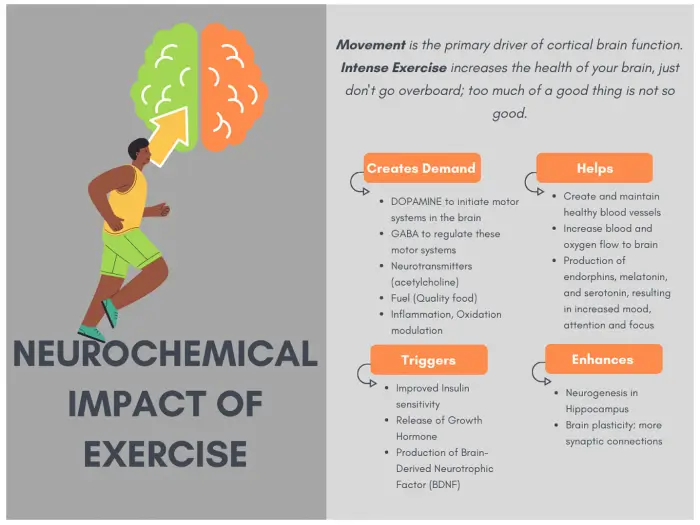In recent years, the connection between exercise and brain health has garnered significant attention from researchers and health enthusiasts alike. The link between physical activity and cognitive function is not just a passing trend; it is a scientifically backed relationship that highlights the profound impact of exercise on our mental well-being. Engaging in regular physical activity can lead to improved memory, enhanced mood, and even a reduced risk of cognitive decline as we age. This article delves into the intricate ways in which exercise influences brain health, making it a crucial topic for anyone looking to boost their mental acuity and overall quality of life.
As you continue reading, you will uncover the various mechanisms through which exercise promotes brain health, including the release of beneficial hormones and the enhancement of neuroplasticity. We will explore the types of exercises that are particularly effective in stimulating brain function, from aerobic workouts to strength training. Additionally, we will discuss the role of exercise in combating mental health issues such as anxiety and depression, providing you with a comprehensive understanding of how staying active can lead to a healthier mind.
Whether you are a fitness enthusiast or just beginning your journey towards a more active lifestyle, this article aims to equip you with valuable insights and practical tips. By understanding the link between exercise and brain health, you can make informed decisions that not only benefit your body but also your mind. So, lace up your sneakers and join us as we explore the transformative power of exercise on brain health!
How Physical Activity Enhances Cognitive Function
Regular physical activity has been shown to significantly enhance cognitive function, which includes processes such as memory, attention, and problem-solving skills. Engaging in exercise increases blood flow to the brain, delivering essential nutrients and oxygen that are vital for optimal brain function. This increased circulation can lead to the growth of new neurons, a process known as neurogenesis, particularly in the hippocampus, an area of the brain associated with learning and memory.
Moreover, exercise stimulates the release of various neurotrophic factors, such as Brain-Derived Neurotrophic Factor (BDNF), which play a crucial role in promoting the survival and growth of neurons. Higher levels of BDNF are linked to improved cognitive abilities and a reduced risk of neurodegenerative diseases. Studies have shown that individuals who engage in regular aerobic exercise tend to perform better on cognitive tests compared to those who lead a sedentary lifestyle, highlighting the importance of physical activity for maintaining cognitive health throughout life.
Exercise as a Tool for Reducing Stress and Anxiety
In addition to enhancing cognitive function, exercise serves as an effective tool for reducing stress and anxiety, which can have a profound impact on brain health. Physical activity triggers the release of endorphins, often referred to as “feel-good” hormones, which can elevate mood and promote a sense of well-being. This biochemical response helps to alleviate feelings of stress and anxiety, creating a more conducive environment for cognitive processes to thrive.
Furthermore, engaging in regular exercise can improve sleep quality, which is essential for cognitive function and overall brain health. Poor sleep is often linked to increased levels of stress and anxiety, creating a vicious cycle that can impair cognitive abilities. By incorporating physical activity into daily routines, individuals can break this cycle, leading to improved mental health and enhanced cognitive performance. The positive effects of exercise on mood and stress management underscore its importance as a holistic approach to maintaining brain health.
Conclusion
In summary, the link between exercise and brain health is multifaceted, encompassing improvements in cognitive function, stress reduction, and overall mental well-being. By prioritizing physical activity, individuals can not only enhance their cognitive abilities but also foster a healthier mental state, ultimately contributing to long-term brain health.
Regular physical activity is not only beneficial for physical health but also plays a crucial role in maintaining and enhancing brain health. Below is a summary of the key points regarding the relationship between exercise and brain health.
| Aspect | Description |
|---|---|
| Improved Cognitive Function | Exercise increases blood flow to the brain, which can enhance cognitive functions such as memory, attention, and problem-solving skills. |
| Neurogenesis | Physical activity promotes the growth of new neurons in the hippocampus, a region associated with learning and memory. |
| Mood Enhancement | Exercise stimulates the release of endorphins and other neurotransmitters, which can improve mood and reduce symptoms of anxiety and depression. |
| Reduced Risk of Cognitive Decline | Regular exercise is linked to a lower risk of developing neurodegenerative diseases such as Alzheimer’s and dementia. |
| Stress Reduction | Physical activity helps to lower stress levels, which can have a positive impact on overall brain health and function. |
| Social Interaction | Participating in group exercises or sports can enhance social connections, which are important for mental well-being. |
| Sleep Quality | Regular physical activity can improve sleep patterns, which are essential for cognitive function and overall brain health. |
In conclusion, incorporating regular exercise into your routine can significantly benefit brain health, enhancing cognitive functions, mood, and overall mental well-being.

